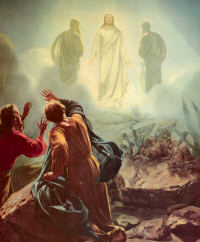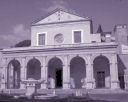My joy and crown … stand firm in the Lord. (Philippians 4:1)
Not only was St. Paul passionate about his faith, he was also highly educated. He was well versed in the Hebrew Scriptures as well as in Jewish and Roman law. He was fluent in multiple languages and was an accomplished debater as well. But in spite of all these achievements, Paul considered the people he served to be his true “crown.” Every person, whether educated or uneducated, rich or poor, Jew or Greek, held a special place in his heart. In today’s second reading, as he encourages his friends in Philippi to stand firm, Paul can’t help but tell them how deeply he treasures them.
If these people were jewels in Paul’s crown, how much more are we all jewels in Jesus’ crown! Each one of us, regardless of our achievements, skills, history, or social status, is a precious treasure to the Lord. He considers each of us—yes, even you—worth his time and his energy. You are so valuable to him, in fact, that he became a man and willingly shed his own blood in order to win you back to his Father.
The thought that we are so valuable to Jesus can help us to stand firm—just as the Philippians stood firm. Knowing that the Lord of all creation considers us so important can strengthen us in the battle against temptation. It can reveal to us the great dignity that we have in Christ. It can convince us that we don’t have to settle for a lesser experience of God’s love and grace. If Jesus considers each of us worth dying for, surely we can consider him worth living for!
At Mass today, we will hear the story of Jesus’ transfiguration. As you do, picture yourself on that mountain with Jesus. Tell yourself that he went through the cross so that you could be transfigured with him in heaven. You are of infinite value to the Lord. You certainly can stand firm because of his love for you!
“Lord Jesus, show me how precious I am to you.”
Genesis 15:5-12, 17-18
1. Lent is not an isolated personal affair. As we begin this Second Sunday in Lent, we are reminded in the first reading that beginning with Abraham we belong to a great people to whom God has given a promise and a covenant. Your family and your parish are part of the people of God. What steps are you taking this Lent to help your family and your parish prepare for the Easter celebration?
2. The Responsorial Psalm is a prayer in which the Psalmist asks God not to hide his face from him—so that he may seek his presence. What does the Psalmist say is the benefit of such seeking? What practical steps can you take this Lent to spend more time seeking God’s presence in prayer?
3. In the second reading, St. Paul, who so loved the Christian community that he called it his “joy and crown,” reminds us that our true “citizenship is in heaven.” What do you think St. Paul meant by this statement? What approach can you take this Lent (e.g., almsgiving and fasting) that will provide evidence of where your true citizenship resides?
4. In the Gospel, both the law and the prophets (Moses and Elijah), as well as the very voice of the Father himself, bear witness to Jesus. The Holy Father, in his teachings and his writings, repeatedly asks us to be a witness to others for Jesus. What are some obstacles in your life in bearing witness to Jesus? What are some ways you can overcome them?
5. In the meditation, we are reminded that Jesus “went through the cross so that we could be transfigured with him in heaven.” Do you consider this future reality as you read the story of Jesus’ Transfiguration? Does your experience at Mass, in prayer, or while reading Scripture, reflect the promise that you can hear from heaven and be transformed by what you hear and experience? How can you strengthen this reality in your life?
6. Has there ever been a time when you believe you heard God “speak” to you. What was the impact on your life?
7. Take some time now to pray and ask for the grace to more deeply understand and experience the truth of who you are in Christ. Use the prayer at the end of the meditation as a starting point.

 The Gospel is from St. Luke 9:28-36. It was out of the abundance of his divine love that God gave a glimpse of the future glory of Christ in his risen humanity to the three disciples on that memorable occasion. And with Christ he showed two others of his faithful servants also in glory. He understood the human weakness of the disciples, and foresaw the shock to their faith which the sad scenes of the passion and crucifixion of their beloved Master would be some weeks later. So, to strengthen and forearm them for that sad trial, he gave them a glimpse of the future glory which was to be theirs, too. if they persevered.
The Gospel is from St. Luke 9:28-36. It was out of the abundance of his divine love that God gave a glimpse of the future glory of Christ in his risen humanity to the three disciples on that memorable occasion. And with Christ he showed two others of his faithful servants also in glory. He understood the human weakness of the disciples, and foresaw the shock to their faith which the sad scenes of the passion and crucifixion of their beloved Master would be some weeks later. So, to strengthen and forearm them for that sad trial, he gave them a glimpse of the future glory which was to be theirs, too. if they persevered. 